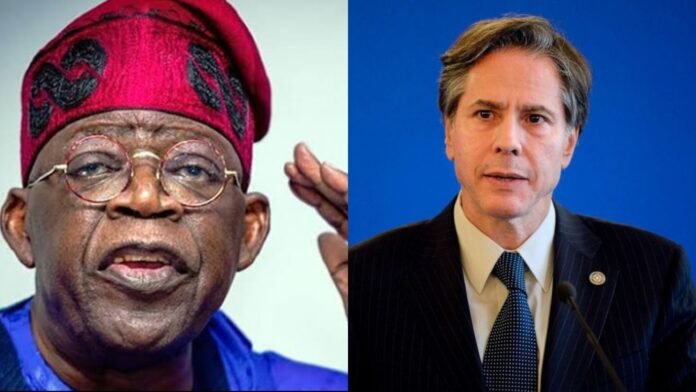The United States Secretary of State, Antony Blinken, will on Tuesday meet the presidents of Nigeria and Ivory Coast in a bid to forge a united front with key African democracies as crises engulf the world.
In Abidjan, Blinken will meet Ivorian President Alassane Ouattara, a veteran leader who has won US praise for consolidating democracy, before heading to Abuja to see Nigerian President Bola Tinubu, elected last year on a platform of economic reforms.
The two West Africa powers, one English-speaking and one French-speaking, have largely stood by the United States despite unease in much of the continent over the Western focus on arming Ukraine and, more recently, US support for Israel in its war with Hamas.
Nigeria, Africa’s most populous country, and Ivory Coast — as well as Kenya in East Africa — joined the United States in a United Nations vote in 2022 to condemn Russia’s invasion of Ukraine.
Their stance stands in contrast with another heavyweight, South Africa, which the United States has accused of allowing arms shipments to Russia and which most recently annoyed Washington by bringing a genocide case against Israel before the International Court of Justice.
Blinken will not travel to South Africa on the trip but he will visit Angola, which has transitioned from war to democracy and played a vital role in mediating to end unrest in the neighbouring Democratic Republic of Congo.
And on Monday, he stopped in Cape Verde, a long-standing partner of the United States.
Blinken has sought to showcase a softer side during his trip.
On Monday, he attended a critical football game in the Africa Cup of Nations between Ivory Coast and Equatorial Guinea, when his hosts gifted him an Ivorian orange jersey bearing his name.
Visiting a port in Cape Verde’s capital Praia that was expanded through US assistance, Blinken said the United States was “all in” for Africa.
“We see Africa as an essential, critical, central part of our future,” Blinken said.
Yet US President Joe Biden failed to live up to a promise, made to African leaders who visited Washington in late 2022, to travel to the continent in 2023.
Blinken, who has been occupied by the Middle East crisis, is making his first trip to sub-Saharan Africa in 10 months.
On his last visit to the region, Blinken travelled to Niger to bolster the elected president, Mohamed Bazoum.

Four months later, the army deposed Bazoum.
The coup leaders threw out troops from former colonial power France but have allowed the presence of some 1,000 US troops, who use Niger’s desert as a base for drones in the fight against jihadists.
The coup leaders, however, have also moved closer to Russia, whose ruthless Wagner mercenaries are already involved in Mali, Central African Republic, and allegedly, Burkina Faso.
Ivory Coast and Nigeria have been outspoken in opposing Niger’s coup, with Ouattara musing about the possibility of military intervention.
Ouattara has won praise for his own efforts to stop the spread of insurgency to northern Ivory Coast, including economic support to give opportunities to young people.
The approach is in line with that of the Biden administration, which has called for a less military-first approach to the Sahel region after a decade of warfare backed by France to hunt down jihadists.
Nigeria’s Tinubu met Biden in September on the sidelines of the Group of 20 summit in India, but Blinken’s visit marks the most extensive high-level US interaction with him.
Tinubu’s national security advisor, Nuhu Ribadu, recently visited Washington and later attended a meeting on the sidelines of the World Economic Forum in Davos on Ukraine’s “peace formula”.
The United States has welcomed Tinubu’s call for an inquiry after a recent Nigerian army drone strike killed 85 civilians by mistake.


